Efecto de oligofructosa de agave en dietas de gallinas ponedoras en la producción de huevos
IF 0.3
4区 农林科学
Q4 AGRICULTURE, DAIRY & ANIMAL SCIENCE
引用次数: 2
Abstract
Objective . To determine egg production in laying hens treated with oligofructose from agave. Materials and methods . Eighteen weeks old Hy-line W-36 hens (n=300) were distributed randomly into 3 treatment groups: no feed supplementation (control) or feed supplementation with 0.1% of 0.2% oligofructose from agave (OFA). Hens were monitored from development until 30 weeks of egg laying. Results . A significant (p<0.05) increase in the percent of egg-laying hens as well as increased in egg weight and egg quality occurred in hens from the OFA treatment groups relative to the control hens. Significantly lower levels (p<0.05) of fecal putrescine were observed in hens from the OFA treatment groups. Conclusions. The oligofructose from agave may be used as an alternative feed additive in laying hens.龙舌兰低聚果糖饲粮对蛋鸡产蛋量的影响
目标。龙舌兰低聚果糖对蛋鸡产蛋量的影响。材料和方法。选取18周龄海兰W-36母鸡300只,随机分为3个处理组:不添加饲料(对照组)和添加0.1%的龙舌兰低聚果糖(OFA)。母鸡从发育到下蛋30周被监测。结果。与对照组相比,OFA各处理组蛋鸡产蛋率、蛋重和蛋品质均显著(p<0.05)提高。OFA各处理组鸡粪腐胺水平显著降低(p<0.05)。结论。龙舌兰低聚果糖可作为蛋鸡的替代饲料添加剂。
本文章由计算机程序翻译,如有差异,请以英文原文为准。
求助全文
约1分钟内获得全文
求助全文
来源期刊

Revista Mvz Cordoba
农林科学-奶制品与动物科学
CiteScore
0.70
自引率
0.00%
发文量
41
审稿时长
6-12 weeks
期刊介绍:
The Journal MVZ Córdoba is an open access international scientific journal financed and edited by the University of Córdoba (Colombia). The journal publishes quarterly, continuously in PDF, XML, Epub, original articles, literature reviews, brief communications and clinical cases, peer-reviewed (double-blind) in Spanish and English, which are related to the agricultural and veterinary sciences. The journal is directed to natural and legal persons of veterinary medicine, animal husbandry, public health, epidemiology, aquaculture, biology, basic biomedical sciences and biotechnology and constitutes a space for academic and scientific discussion around the work of professionals in Veterinary Medicine and Zootechnics. Four-monthly publication.
"The Journal MVZ Córdoba supports the policies for registration of clinical trials of the World Health Organization (WHO) and the International Committee of Medical Journal Editors (ICMJE), since it recognizes the importance of these initiatives for international registration and dissemination. of information about clinical studies, in open access. As a result, since 2007, the journal MVZ Córdoba only publishes clinical research articles that have received an identification number in one of the Clinical Trial Registries validated by the criteria established by WHO and ICMJE, whose addresses are available in the ICMJE website. The identification number is recorded at the end of the summary. "
 求助内容:
求助内容: 应助结果提醒方式:
应助结果提醒方式:


